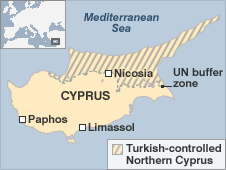IN A SPEECH, he made at the University of Bosporus, 10 days ago, Turkey’s Minister of European Affairs Egemen Bagis, said that Turkey would even discuss the withdrawal of all troops from Cyprus.
“In Cyprus, Greece also has troops and Britain has military bases. If there is a possibility, for all the troops to withdraw, then come and let’s talk about it.”
 Agreeing to discuss the full withdrawal of Turkish troops from Cyprus is unprecedented in the history of the Cyprus problem. So much so, it should have become a leading news item in the media. But it was ignored and did not make it into the ongoing Cyprus problem debate.
Agreeing to discuss the full withdrawal of Turkish troops from Cyprus is unprecedented in the history of the Cyprus problem. So much so, it should have become a leading news item in the media. But it was ignored and did not make it into the ongoing Cyprus problem debate.
Had Bagis said “the army will never withdraw from Cyprus”, or had he repeated what Turkish politicians had all been saying until 2002, namely “the Cyprus problem was solved in 1974”, we would never have heard the end of it.
It makes you wonder whether we actually want the withdrawal of the Turkish troops or whether their presence suits us, as it ensure the ethnic purity of half the island. Is re-unification a sincere objective, or is partition preferable to the majority of the people? This is, more or less, the historical dilemma that Cypriots are facing and will need to make a final decision on in the next few months.
In the last eight years Turkey has radically revised its foreign policy. Gone is the view that the country was surrounded by hostile countries, replaced with the doctrine of “zero problems with our neighbours”. Ankara has resolved its disputes with Syria and Russia, improved relations with Greece and has been trying to do the same with Armenia, but it is not making any headway on the Cyprus problem which is poisoning its dealings with the European Union. Turkey wants a Cyprus deal because the net benefits of a solution far outweigh the net losses for maintaining the status quo.
After 40 years of division, there is a Turkish population in Cyprus which accounts for 20 to 25 per cent of the total. With the passing years, these people have acquired rights in the occupied areas that have been acknowledged by the European Court of Human Rights. Consequently, either we will govern the whole island together or we will split it in two.
Turkey could push things in either direction, but it seems that, for many important reasons, she would rather have the participation of the Turkish population in the running of the whole island than have total control of half. But to gain participation in running the whole island, the Turkish side would need to give things in exchange – complete withdrawal of troops, a ceiling on the number of Turkish nationals that would be part of the Turkish Cypriot community, a return of territory and a contribution to the compensation fund for properties are some of them.
The Greek Cypriot side suffers from an inherent weakness by failing to follow this changing Turkish policy and still approaches it with a Cold War mentality. This is why it interprets every change in Turkish positions as a “communications tactic” which nobody else buys.
But instead of being in denial about these changes, the Cyprus government should have set out its priorities, conveyed them and explained them to its EU partners and sincerely committed itself – not take the EU for a ride as it had done in 2004 – to signing an agreement if these conditions were met. It could also have proposed an international conference in which Greece, Turkey and the EU participated, for overcoming any persistent differences.
Of course, the choice may be permanent separation, in which case President Christofias would need to muster the courage to negotiate the terms of partition rather than allow it to be imposed by default. We are heading in this direction thanks to the government’s dogmatic position about a Cypriot solution by Cypriots, “without time-frames and arbitration”. Inevitably, we are arriving at partition under the worst possible terms.
By Makarios Drousiotis
Published on June 20, 2010
Source: Cyprus Mail



 Reports that Lopez would perform at a luxury hotel in the north on her 41st birthday this month triggered a Greek Cypriot online campaign pushing for cancellation.
Reports that Lopez would perform at a luxury hotel in the north on her 41st birthday this month triggered a Greek Cypriot online campaign pushing for cancellation.
 NICOSIA, Cyprus — Jennifer Lopez has stepped into a diplomatic minefield by agreeing to perform in Turkish-occupied northern Cyprus, stirring anger among thousands of Greek Cypriots.
NICOSIA, Cyprus — Jennifer Lopez has stepped into a diplomatic minefield by agreeing to perform in Turkish-occupied northern Cyprus, stirring anger among thousands of Greek Cypriots.
 Agreeing to discuss the full withdrawal of Turkish troops from Cyprus is unprecedented in the history of the Cyprus problem. So much so, it should have become a leading news item in the media. But it was ignored and did not make it into the ongoing Cyprus problem debate.
Agreeing to discuss the full withdrawal of Turkish troops from Cyprus is unprecedented in the history of the Cyprus problem. So much so, it should have become a leading news item in the media. But it was ignored and did not make it into the ongoing Cyprus problem debate.